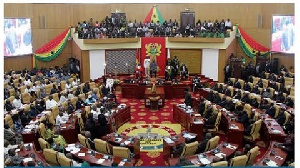Parliament, Wednesday, granted GHC398million worth of tax reliefs to help reduce the burden on the few Ghanaian individuals and companies captured under the tax net.
Those tax cuts were made possible following the approval of the;
Special Petroleum Tax (Amendment) Bill, 2017
Customs and Excise (Petroleum Taxes and Petroleum Related Levies) (Repeal) Bill, 2017
Income Tax (Amendment) Bill, 2017 and
Special Import Levy (Amendment) Bill, 2017
The Special Petroleum Tax Act, 2014 (Act 879) was passed in 2014 to help shore up government revenue from taxation. It imposed a tax rate 17.5% on some petroleum products. The object of the Bill was to reduce the 17.5% tax rate to 15%. The reduction is therefore expected to affect the country’s revenue generation by GH?243million.
This, according to the Chairman of the Finance Committee, Hon. Dr. Mark Assibey-Yeboah, will reduce the tax burden on petroleum consumers and give impetus to Government’s policy of directing petroleum prices in the downward direction.
He further told Parliament that the government intends to make up for the loss through enhanced method of revenue generation.
In the case of the Customs and Excise (Petroleum Taxes and Petroleum Related Levies) (Repeal) Bill, 2017, its objective was to remove the rates of excise duty on petroleum products by repealing the Act 684 to reduce the tax overlays in the petroleum industry.
This move by the government is therefore expected to cost the nation GH?84million.
That of the Special Import Levy (Amendment) Bill, 2017, was to remove the 1% levy payable on specific imported goods.
This move is also expected to cost the nation GH?71million with the government hoping to recover the amount through better management of other revenue sources.
The Income Tax (Amendment) Bill, 2017, on the other hand, sought to amend the Income Tax Act, 2015 (Act 896) to exempt the gain on realization of securities of companies listed on the Ghana Stock Exchange (GSE) from income tax for the period 2017 to 2021.
The measure, Kasapafmonline.com understands, was introduced to attract more investment onto the Exchange especially, the ever growing pension funds in the economy since there is not much activity going on at the GSE due to illiquidity situation on the Exchange.
Business News of Saturday, 18 March 2017
Source: kasapafmonline.com













